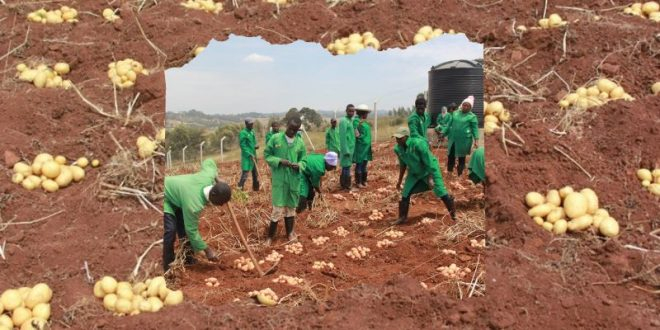#BiotechPotato #LateBlight #PotatoFarming #AgriculturalInnovation #KenyanAgriculture #CropDiseaseResistance #GlobalBiotechPotatoPartnership #SustainableFarming #FoodSecurity #Biosafety #AgricultureResearch
In the highlands of Kenya, where potatoes are a vital food and cash crop, a group of foreign and national researchers is making significant strides in addressing the persistent challenge of late blight disease. Dr. Catherine Taracha, the Principal Investigator for the project at Kenya Agricultural and Livestock Research Organization (KALRO), highlights the severity of the issue, with 30 to 60% of the annual potato crop lost to late blight.
The ongoing Confined Field Trials (CFTs) in Muguga, Njabini, and Molo aim to assess four genetically modified biotech potato cultivars. The data collected from these trials will determine the cultivars proceeding to the National Performance Trials (NPTs), a crucial step in bringing late blight-resistant varieties to farmers.
Late blight management remains a major challenge for smallholder farmers, who often resort to frequent pesticide spraying—up to 20 times per season—to protect their crops. Dr. Taracha emphasizes the role of biotech varieties in optimal disease management, especially for resource-strained farmers.
The National Biosafety Authority (NBA) has approved the CFTs, allowing researchers to conduct trials over three seasons to gather comprehensive data. Erick Korir, principal biosafety officer at the NBA, underscores the importance of stringent biosafety procedures, given the genetically modified nature of the crops.
The potential release of biotech potato varieties to farmers offers hope for a transformative change in potato farming. The second wave of Multi-Location CFTs (ML-CFTs) reveals promising results, with biotech potatoes demonstrating higher yields and resistance to late blight without the need for chemical sprays.
The Feed the Future Global Biotech Potato Partnership initiative, spanning Kenya, Nigeria, Bangladesh, Indonesia, and other nations, is a collaborative effort led by Michigan State University. Partnerships with institutions like the International Potato Center (CIP), KALRO, and AATF underscore the global significance of this endeavor.
The strides made in Kenya’s biotech potato project signify a potential breakthrough in the battle against late blight, offering a brighter future for potato farming. The prospect of providing farmers with late blight-resistant varieties within two years could not only enhance harvests but also contribute to food security and poverty alleviation in the region.






